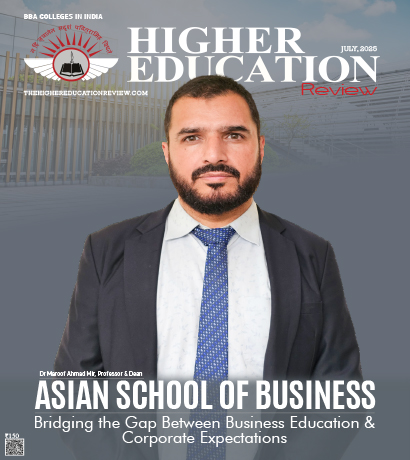Adapting to Change: The Top Higher Education Trends for 2024
 As the global landscape of higher education continues to evolve, educators, institutions, and learners find themselves at the intersection of technological advancements, changing societal needs, and pedagogical innovations. The year 2024 promises to be a transformative period, with several trends shaping the future of higher education. In this comprehensive exploration, we delve into the top trends that are likely to define the higher education landscape in 2024, spanning from technological integration and educational accessibility to evolving learning methodologies and the growing importance of soft skills.
As the global landscape of higher education continues to evolve, educators, institutions, and learners find themselves at the intersection of technological advancements, changing societal needs, and pedagogical innovations. The year 2024 promises to be a transformative period, with several trends shaping the future of higher education. In this comprehensive exploration, we delve into the top trends that are likely to define the higher education landscape in 2024, spanning from technological integration and educational accessibility to evolving learning methodologies and the growing importance of soft skills.
Digital Transformation Acceleration & Hybrid Learning Models
In 2024, the acceleration of digital transformation in higher education will be palpable. The COVID-19 pandemic acted as a catalyst for institutions to embrace online learning, and this trend is set to continue and evolve. EdTech solutions, such as virtual reality (VR) and augmented reality (AR), will play a pivotal role in creating immersive and engaging learning experiences. Artificial intelligence (AI) will also gain prominence, offering personalized learning paths and automating administrative tasks to enhance efficiency.
Hybrid learning, combining both in-person and online components, will become the norm rather than the exception. This model offers flexibility for students, allowing them to choose the most effective learning environment based on their needs. Institutions will invest in creating seamless transitions between online and offline modalities, fostering a dynamic learning ecosystem that adapts to the preferences and circumstances of individual learners.
“The digital transformation of education has the potential to fundamentally improve the teaching and learning experience. The COVID-19 pandemic provided a welcome boost to digital education, but we need to further leverage the necessary tools and systems to adapt instruction to the needs of each student and design early warning systems to identify students at risk of dropping out of school,” OECD Secretary-General, Mathias Cormann said.
Emphasis on Lifelong Learning & Focus on Equity and Inclusion
The concept of lifelong learning will gain renewed emphasis in 2024, reflecting the need for continuous skill development in a rapidly changing job market. Higher education institutions will increasingly offer modular courses, micro-credentials, and stackable degrees, allowing learners to acquire and update specific skills throughout their careers. The traditional model of a four-year degree will be complemented by flexible, on-demand learning opportunities.
Addressing issues of equity and inclusion will be a central theme in higher education. Institutions will adopt strategies to make education more accessible to underrepresented groups, ensuring that learning environments are inclusive and supportive. This includes embracing diverse perspectives in curriculum design, providing financial support, and leveraging technology to remove barriers to access.
Rise of Competency-Based Education & Integration of Virtual Labs and Simulations
Competency-based education will continue to gain traction in 2024, allowing students to progress based on their mastery of specific skills and knowledge rather than traditional time-based structures. This learner-centric approach promotes a deeper understanding of the material and a more personalized learning experience. Institutions will adapt their curricula and assessment methods to accommodate the principles of CBE.
STEM (Science, Technology, Engineering, and Mathematics) education will witness a transformation through the integration of virtual labs and simulations. These technologies provide hands-on experiences in a virtual environment, allowing students to conduct experiments, explore scientific concepts, and enhance their problem-solving skills. The accessibility and cost-effectiveness of virtual labs make them a valuable addition to traditional laboratory settings.
Scholarlab has a strong ambition to incorporate gaming technologies in order to provide STEM education in a highly effective way. The company designs cutting-edge interactive virtual laboratories in 3D, aiming to greatly improve Science learning outcomes.
Addressing a pressing need in the education landscape, ScholARlab’s CEO “Balaji Venkataraman” remarked, “Our mission is to revolutionize STEM education by making learning Science fun, interactive, and accessible to all. ScholAR transforms traditional experiments into captivating virtual experiences, empowering students to grasp scientific principles with ease.”
Blockchain for Credentials and Verification & Evolving Assessment Methods
Blockchain technology will revolutionize the way academic credentials are issued and verified. In 2024, we can expect an increased adoption of blockchain for secure and transparent credentialing, reducing the risk of fraud. This decentralized approach ensures that individuals have control over their academic records, making the credentialing process more efficient and trustworthy for both employers and academic institutions.
The National Technological University (NTU), located in Singapore, is highly regarded and ranked as one of the top universities in both Asia and the world. They provide specialized courses and degree programs in block chain.
Traditional assessment methods will evolve to better measure students' skills, competencies, and real-world applicability of knowledge. Formative assessments, project-based evaluations, and adaptive testing will gain prominence, providing a more comprehensive understanding of a student's capabilities. This shift aligns with the broader goal of preparing students for the demands of the modern workforce.
Personalized Learning Pathways & Soft Skills Development
Advancements in AI and data analytics will enable the creation of personalized learning pathways tailored to individual student needs. In 2024, educational platforms will use sophisticated algorithms to analyze students' learning styles, preferences, and performance data, delivering customized content and resources. This personalized approach enhances student engagement and promotes a deeper understanding of the subject matter.
Recognizing the increasing importance of soft skills in the professional world, higher education will place a stronger emphasis on their development. Communication, critical thinking, collaboration, and adaptability will be integrated into curricula across disciplines. Educational programs will seek to cultivate well-rounded individuals equipped with the interpersonal skills necessary for success in a rapidly evolving job market.
The higher education landscape in 2024 is poised for significant transformations driven by technology, changing educational paradigms, and a commitment to inclusivity. As institutions navigate these trends, the key will be flexibility and adaptability. The future of higher education lies in creating dynamic, learner-centric environments that respond to the diverse needs of students and prepare them for the challenges and opportunities of the 21st century. Whether through digital innovation, evolving assessment methods, or a renewed focus on lifelong learning, the trends of 2024 paint a picture of a higher education system that is resilient, inclusive, and ready to shape the future of learning.

